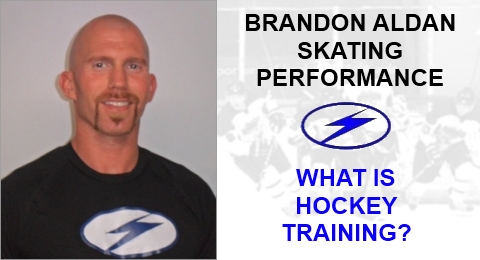What is Hockey Training?

By: Brandon Aldan – Bio
Hockey is a very complex sport with unique demands which makes it very difficult for parents, coaches and athletes to find a properly designed program. I hear a lot of hockey players saying they’ve been lifting weights with the football team all summer or doing P90X. Some are doing something a little more effective by working out at a sports performance facility doing the same general workouts as soccer, football and baseball players. Although, doing these things is better than nothing, this is not hockey training.
The demands of an off-season training program should reflect the demands of the sport. Hockey places very specific demands on the hip complex which need to be trained by a professional that specializes in hip stability/mobility. Hip injuries are among the most common hockey-related injuries and are often the most limiting with the exception of concussions.
The skating position is also very different than other athletic positions and needs to be a major focus of hockey training programs through skating mimicking drills. This will be a topic of future articles but, some examples can be seen on my YouTube channel, BrandonAldanSkating.
Hockey requires a specific type of endurance called anaerobic glycolytic endurance. This isn’t trained through continuous, long-distance running or cycling which many players like to do in the off-season. An effective way to train anaerobic endurance is through high intensity interval training which is done by alternating high intensity sets of 30 to 60 sec with recovery periods of 60 to 90 sec.
To truly get the most out of off-ice training, I would recommend seeking out a hockey strength and conditioning specialist. Unfortunately, there are very few of us in North America but the value of training with these individuals over the average personal trainer cannot be understated. Look for the National Strength and Conditioning Association CSCS certification and inquire about their education which should be a minimum of a Bachelor’s degree in exercise physiology or biomechanics and preferably, a Master’s or PhD. Ask about their training style and what emphasis they put on each athletic quality such as, speed, strength, endurance, etc. Although strength is an important component of hockey fitness, if their program is mainly based on lifting weights, they are not doing hockey-specific training.
As I stated earlier, doing something is likely better than nothing. But, instead of putting your effort into a bodybuilding workout or the latest gimmick program, why not put it into something that will make you a better hockey player?








